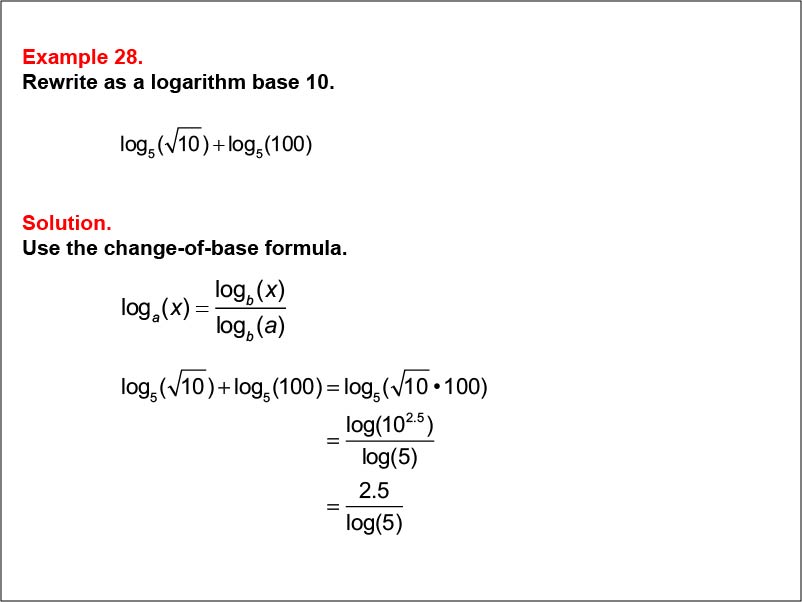
Display Title
Math Example: Laws of Logarithms: Example 28
Display Title
Math Example: Laws of Logarithms: Example 28

Topic
Logarithms
Description
This example illustrates the application of the change-of-base formula to convert the sum of two logarithms with base 5 to a single logarithm with base 10. The problem involves rewriting log5(√(10)) + log5(100) using the common logarithm (base 10). The solution first applies the product rule of logarithms to combine the terms into log_5(√(10) * 100), then uses the change-of-base formula loga(x) = logb(x) / logb(a) to transform it into log(102.5) / log(5), which simplifies to 2.5 / log(5).
This example demonstrates the interplay between various logarithmic properties, including the product rule, properties of square roots, and the change-of-base formula. It showcases how these properties can be combined to simplify and transform complex logarithmic expressions involving irrational numbers. Such problems help students develop a more comprehensive understanding of logarithmic manipulation and enhance their problem-solving skills with advanced mathematical concepts.
By working through examples like this, students learn to approach logarithmic problems strategically, choosing the most appropriate properties and techniques for each situation, even when dealing with more complex expressions. This flexibility in applying logarithmic rules is essential for success in advanced mathematics, engineering, and scientific fields.
Teacher's Script: In this example, we're dealing with the sum of two logarithms with base 5, one involving a square root, and we need to express it as a single logarithm with base 10. Let's start with log5(√(10)) + log5(100). First, we can use the product rule of logarithms to combine these into a single logarithm: log5(√(10) * 100). Now, √(10) * 100 = √(10) * 102 = 102.5. So we have log_5(102.5). To change the base to 10, we apply the change-of-base formula: log_5(102.5) = log(102.5) / log(5) = 2.5 / log(5). This example shows how combining different logarithmic properties can help us simplify and transform complex expressions involving irrational numbers.
For a complete collection of math examples related to Logarithms click on this link: Math Examples: Laws of Logarithms Collection.
| Common Core Standards | CCSS.MATH.CONTENT.HSF.BF.B.5 |
|---|---|
| Grade Range | 9 - 12 |
| Curriculum Nodes |
Algebra • Exponential and Logarithmic Functions • Laws of Logarithms |
| Copyright Year | 2013 |
| Keywords | logarithms, laws of logarithms |